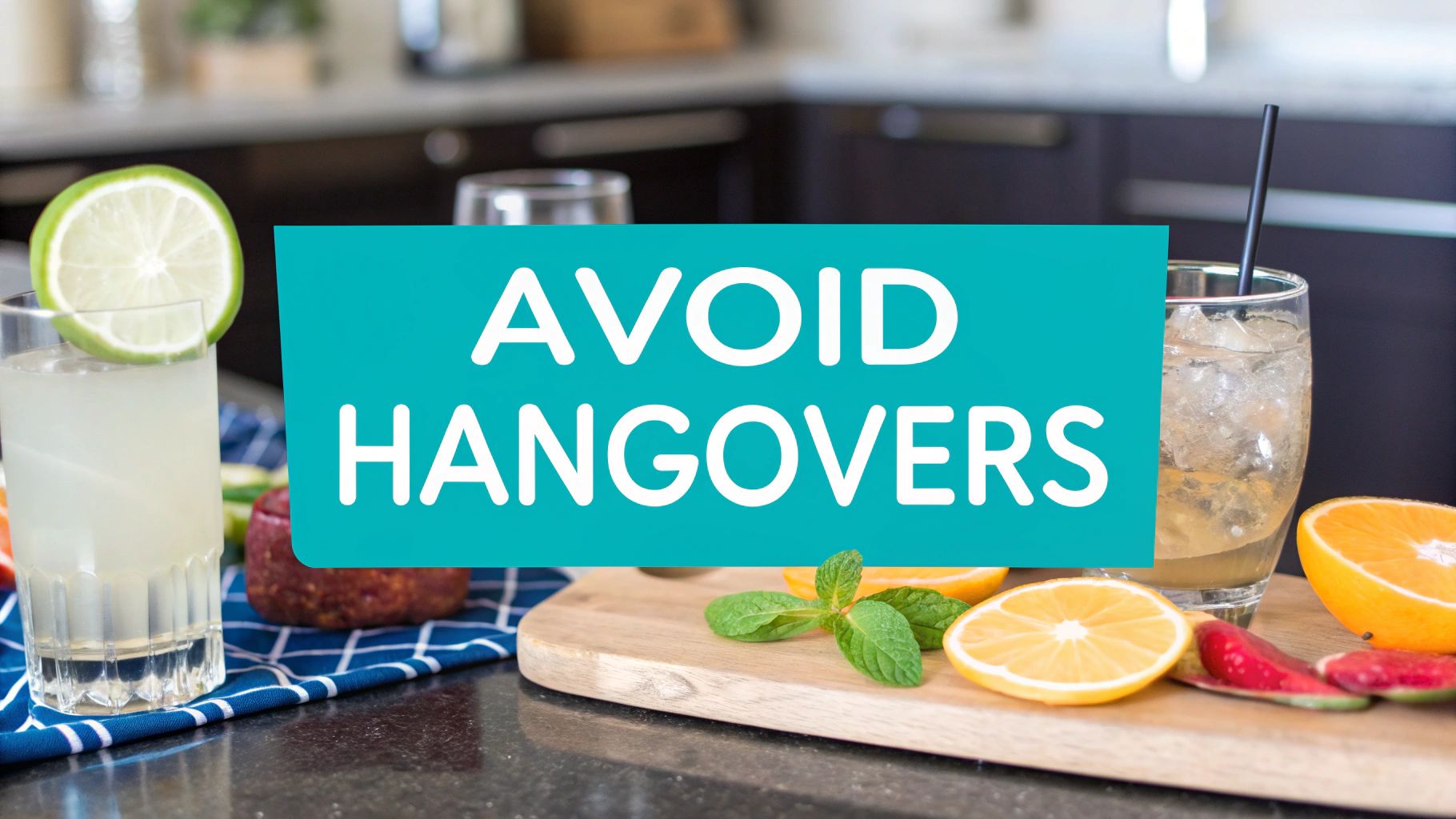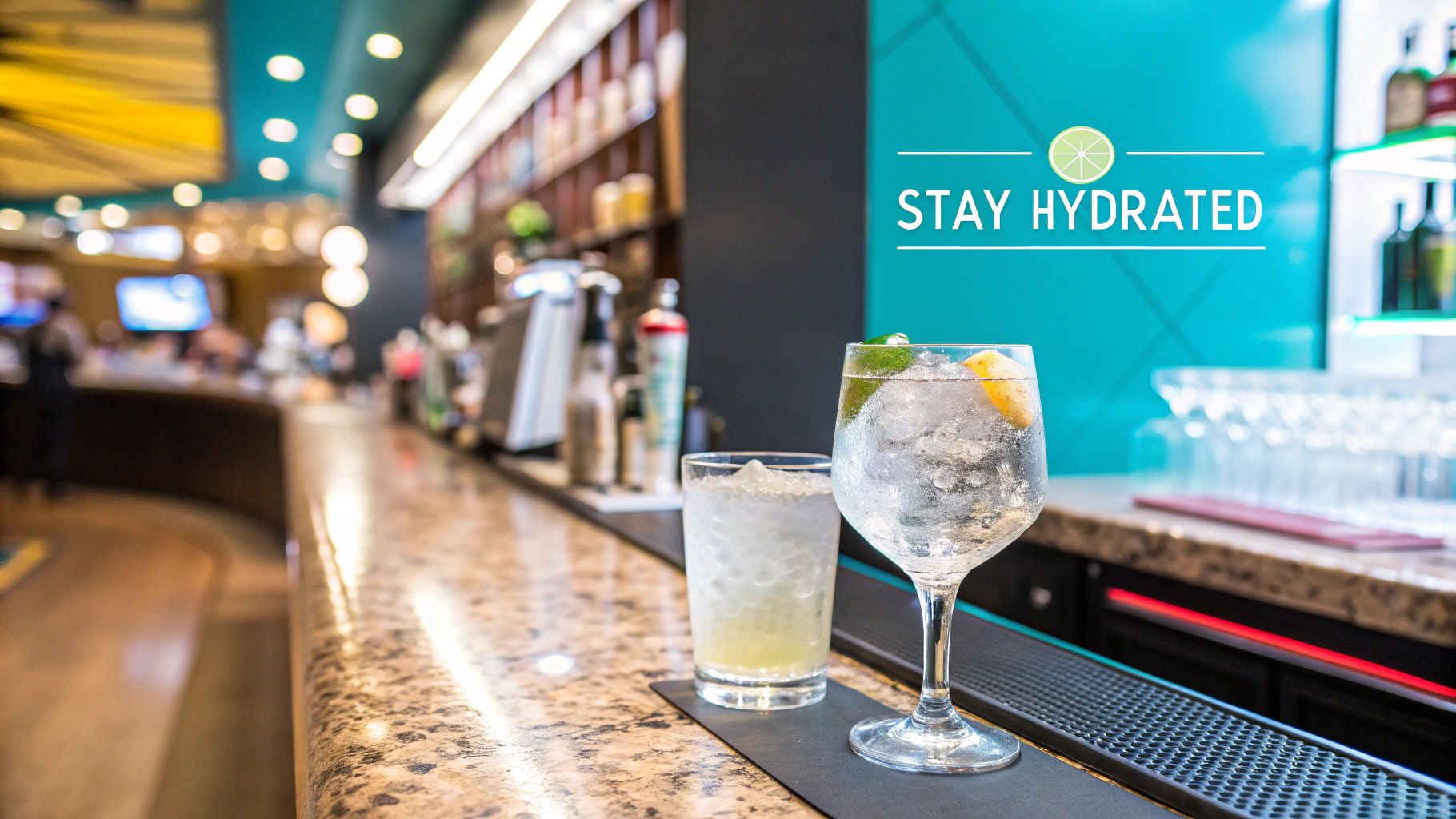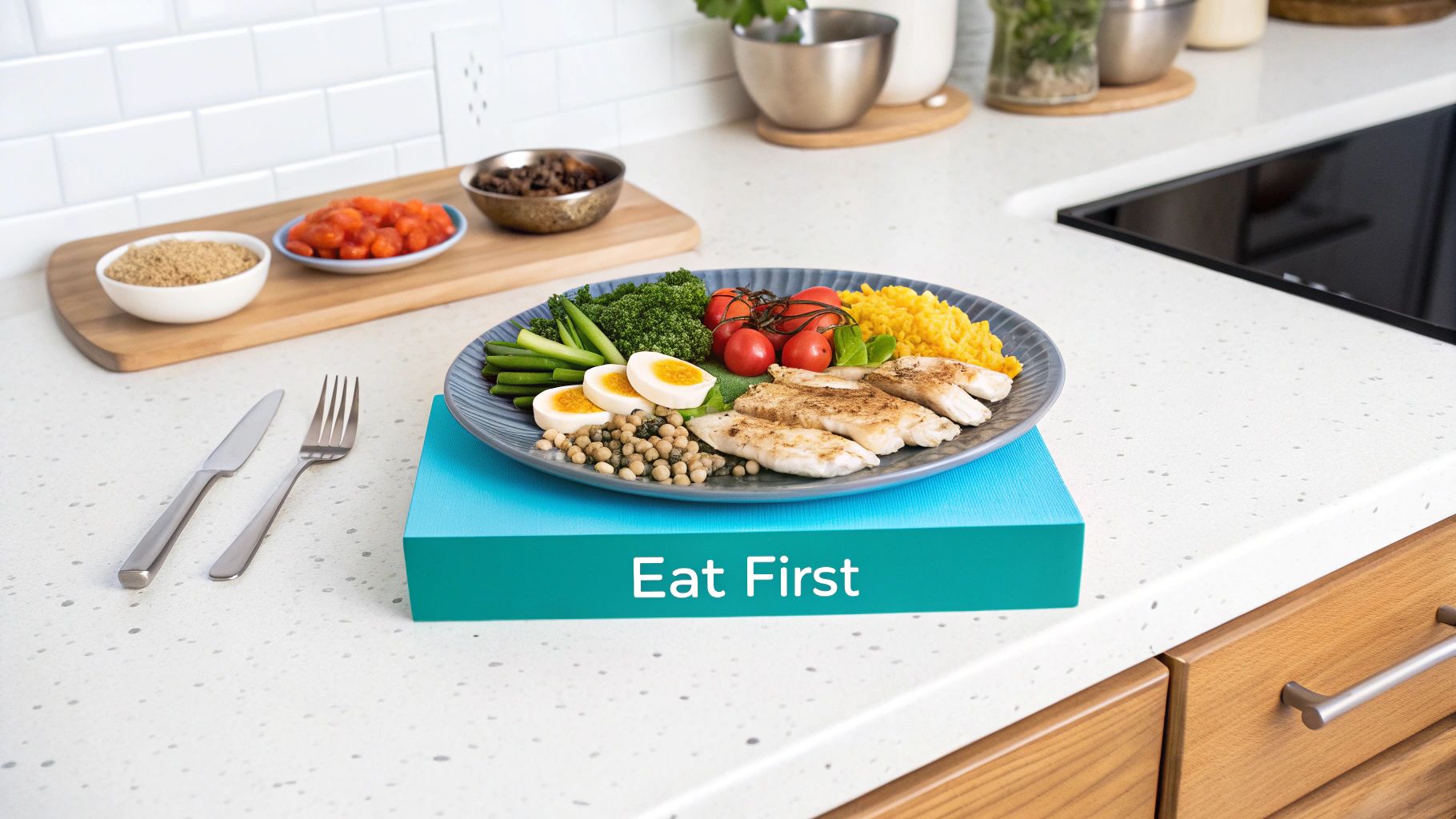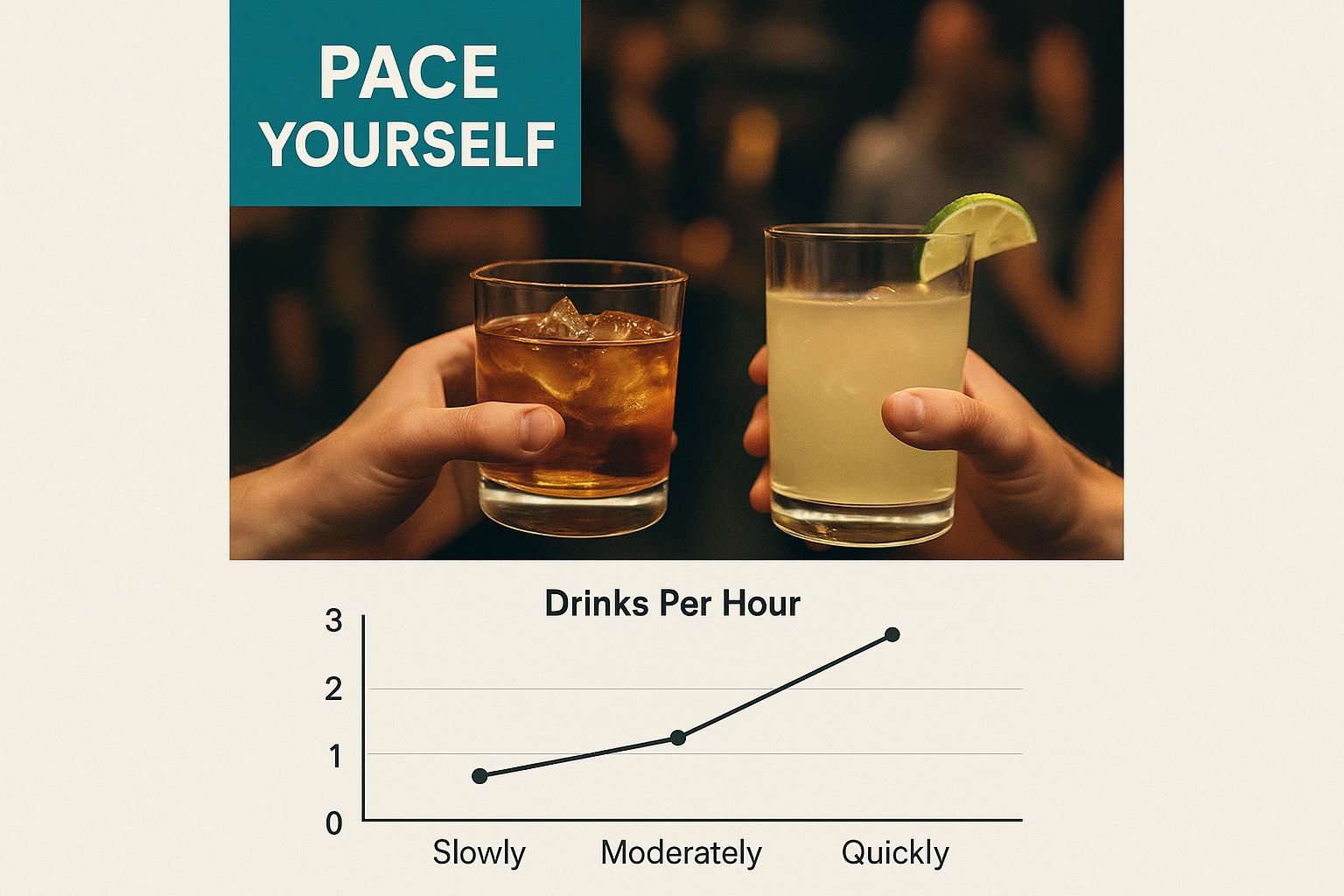

· By Annemarie
How to Avoid a Hangover: Top Tips That Actually Work
Understanding Why Hangovers Happen (And How to Stop Them)

That pounding head and churning stomach? It's not just a "punishment" for a good time. It's your body working overtime to process alcohol. Think of it as a major cleanup operation – and like any big cleanup, it takes time and resources. We're talking everything from your liver breaking down toxins to your kidneys working hard to maintain fluid balance.
This is why understanding how alcohol affects your body is key to avoiding a hangover. For instance, acetaldehyde, a toxic byproduct of alcohol metabolism, is a major hangover culprit. Your liver does its best to convert it to a less harmful substance, but this process isn’t instant, and you feel the effects while you wait. Plus, alcohol is a diuretic, meaning more trips to the bathroom and serious dehydration. This dehydration throws off your electrolyte balance, impacting everything from nerve function to how well your muscles work.
This explains why some people can handle a few drinks while others are down for the count after one or two. Genetics, body composition, and individual metabolic rates all play a role in how your body handles alcohol. Some people naturally produce less of the enzyme that breaks down acetaldehyde, making them more prone to hangovers. Want to know more about these individual differences? Check out our guide on what causes hangovers.
Blood Sugar, Sleep, and Congeners
On top of dehydration and acetaldehyde, alcohol can mess with your blood sugar, leading to that shaky, weak feeling. Your body prioritizes processing the alcohol, leaving less energy for other important functions. This can also disrupt your sleep, even if you log a full eight hours. Alcohol might make you drowsy at first, but it messes with your sleep cycles later, leaving you fatigued and foggy-brained the next day. Preventing a hangover isn't about one magic fix; it's about understanding these different factors and supporting your body through the process.
And finally, there are congeners. These substances are produced during alcohol fermentation and contribute to hangover severity. Darker liquors like whiskey and rum tend to have more congeners than lighter ones like vodka and gin. This is partly why some drinks are infamous for causing brutal hangovers. Understanding these factors helps you make smarter choices and minimize the chances of waking up feeling awful.
To understand this better, let’s take a closer look at common hangover symptoms and their underlying causes:
Here’s a table summarizing the key information:
| Symptom | Root Cause | Prevention Strategy |
|---|---|---|
| Headache | Dehydration, acetaldehyde | Hydrate before, during, and after drinking |
| Nausea | Acetaldehyde, stomach irritation | Eat before drinking, choose lighter-colored alcohols |
| Fatigue | Dehydration, poor sleep quality | Hydrate, avoid sugary mixers, prioritize sleep |
| Muscle aches | Electrolyte imbalance | Hydrate with electrolyte-rich drinks |
| Sensitivity to light and sound | Dehydration, alcohol withdrawal | Hydrate, avoid excessive alcohol consumption |
This table shows the complex interplay of factors that contribute to hangover symptoms. By understanding these connections, you can take targeted steps to prevent them. Remember, prevention is key!
Pre-Drinking Preparation That Makes a Real Difference

Forget that greasy-food-as-hangover-prevention myth. Real talk: prepping for a night out starts way before that first drink. Think of your body like a car about to go on a road trip. You wouldn’t leave with an empty tank, right? Same goes for your system – fueling up before you start drinking is key.
Timing your meals is a game-changer. Eating a balanced meal a few hours before drinking gives your body the tools it needs to process the alcohol. Think complex carbs, lean protein, and healthy fats. It's not about stuffing yourself silly; it’s about providing your metabolism with something substantial to work on. For example, if I'm heading out later, I’ll have salmon, quinoa, and roasted veggies a few hours beforehand. This has made a huge difference for me. Check out our guide on the best foods to eat before drinking for more ideas.
Hydration and Supplements: Setting the Stage
Hydration is crucial, and I’m not talking about chugging water right before you leave. Consistent hydration throughout the entire day leading up to your night out is what really matters. Think of it as pre-hydrating. Your cells are like little sponges, absorbing water gradually, not all at once. This way, you're starting the night already well-hydrated.
Supplements can also lend a hand. B vitamins are essential, as alcohol depletes them. Taking a B-complex vitamin beforehand can help top up these important nutrients. Remember, though, supplements are best used alongside a healthy diet, not as a replacement. This increasing interest in natural support isn't surprising; the global hangover cure market is expected to hit $6.18 billion by 2030, driven by rising awareness and the use of herbal ingredients. Want to learn more? Discover more insights about the growing market.
Getting ready for a night out doesn't need to be complicated. It’s all about setting your body up for success. Focusing on hydration, balanced meals, and targeted supplements can significantly reduce your chances of a rough morning. This creates a solid foundation for the smart drinking strategies we’ll cover next.
Smart Drinking Strategies for Hangover Prevention

This infographic shows two hands gently clinking glasses—a visual reminder of the importance of pacing. When you sip slowly, your body processes the alcohol more efficiently, preventing that nasty toxin buildup that leads to a hangover.
So, you've prepped your body. Now, let's talk strategy. Preventing a hangover isn't about skipping the fun, it's about making smart choices while you're having it. This means knowing how different drinks affect you and using strategies to keep you feeling good all night—and the next morning.
Pace Yourself, Choose Your Drinks Wisely
One of the best ways to avoid a hangover? Pace yourself. I've learned this the hard way: sipping slowly and spacing out drinks makes a huge difference. Aim for roughly one drink per hour. This gives your body time to metabolize the alcohol and prevents a sudden blood alcohol spike, a major hangover culprit.
What you drink also matters. Remember congeners? They have a big impact on hangover severity. While that dark rum old fashioned might be calling your name, lighter spirits like vodka or gin can be a game-changer. Personally, I find a vodka soda much easier on my system than a dark rum cocktail.
Mixing and Matching: What to Avoid
What you mix with your alcohol is just as important as the alcohol itself. Sugary mixers can dehydrate you and lead to a blood sugar crash, making your hangover even worse. Plus, highly carbonated mixers can speed up alcohol absorption, leading to faster intoxication and a potentially worse hangover. Try low-sugar options like soda water with a splash of lime or cranberry juice. This simple swap can drastically improve how you feel the next day.
Navigating Social Situations
Let's be real, sticking to your plan in different social situations can be tricky. At a business dinner? Stick to one or two glasses of wine and alternate with water. At a wedding? Enjoy yourself, but be mindful of pacing and what you’re drinking. Having a game plan beforehand can help you stay on track without feeling like you're missing out. It’s all about balance. These strategies help you enjoy social events without sacrificing your well-being the next day.
To help illustrate the impact of different alcohol choices, let's take a look at this comparison:
Alcohol Types and Hangover Risk Comparison
This table compares different alcoholic beverages and how likely they are to cause hangovers, based on congener content and other factors.
| Alcohol Type | Hangover Risk Level | Key Factors | Better Alternatives |
|---|---|---|---|
| Dark liquors (rum, whiskey, tequila) | High | High congener content | Vodka, gin, light beer |
| Red wine | Medium | Congeners, tannins | White wine, spritzers |
| Light beer | Low | Lower alcohol content, fewer congeners | Non-alcoholic beer |
| Vodka, Gin | Low | Low congener content | - |
| Sugary cocktails | High | Sugar content exacerbates dehydration | Vodka soda, light beer |
| Highly carbonated mixers | Medium | Speeds up alcohol absorption | Soda water with lime/cranberry |
As you can see, choices like dark liquors and sugary cocktails tend to carry a higher hangover risk due to factors like congeners and sugar content. Opting for lighter-colored drinks, being mindful of mixers, and of course, pacing yourself, can significantly reduce your chances of waking up with a headache.
Advanced Hydration Beyond Just Drinking Water
Let's talk hydration, because when it comes to avoiding a hangover, it's way more than just chugging water between drinks. It's about understanding how your body processes alcohol and giving it the support it needs. Think of it like this: you wouldn't just water a plant and expect it to thrive without nutrients, right? Same goes for your body.
Your body needs electrolytes, those essential minerals like sodium, potassium, and magnesium that keep everything running smoothly. Alcohol throws these electrolytes out of whack, impacting hydration, nerve function, and even muscle health. Simply downing water can actually dilute your electrolytes further, making it harder for your body to absorb the water efficiently.
Electrolyte Balance and Hydration Timing
So, what's the solution? Replenishing electrolytes strategically. Swap out some of those water breaks for electrolyte-rich drinks. Coconut water is a great option, as are low-sugar sports drinks. You can even find electrolyte tablets to dissolve in water – easy peasy. I'm not saying you need to pack a whole pharmacy kit, just be mindful of what your body needs besides plain H2O.
Timing also matters. Starting your night already well-hydrated makes a huge difference in how your body handles alcohol. Don't wait until you're out to start hydrating; make it a habit throughout the day. And remember, your body keeps processing alcohol even after you've stopped drinking. Morning hydration is key! Reach for water, electrolyte drinks, or even a hydrating broth-based soup when you wake up to help flush out those remaining toxins.
Recognizing Dehydration vs. Other Hangover Causes
The morning after can be rough, and it's important to remember that dehydration isn't the only culprit. While it’s a major player, things like congener buildup (those chemical byproducts in alcohol) and lack of sleep can also contribute to that less-than-stellar feeling.
If you’ve hydrated well but still wake up feeling unwell, think about what else might be going on. Did you choose a type of alcohol high in congeners? Did you skimp on sleep? Understanding these nuances allows you to address the root causes of your hangover. Interestingly, the demand for hangover cure products in North America is growing, driven by changing drinking habits and a focus on wellness. These products often highlight natural ingredients for hydration and liver support, tackling symptoms like nausea and headaches. Discover more insights about the growing market. Just like a garden needs more than just water, preventing a hangover requires a multi-pronged approach that goes beyond simple hydration.
Nutrition and Supplements for Optimal Alcohol Processing
Let's talk about giving your body the best chance against a hangover. It all starts with nutrition. Think of it like this: you wouldn't send a mechanic into a job with just a hammer, right? They need the right tools. Your body needs the right nutrients to process alcohol effectively.
B Vitamins, Antioxidants, and Amino Acids: Your Body's Toolkit
First up: B Vitamins. Alcohol depletes these, especially B1 (thiamine). These vitamins are crucial for energy and nerve function. Replenishing them can significantly impact how you feel the next day. I’ve started taking a B-complex vitamin before I go out, and honestly, it’s made a noticeable difference.
Then there are antioxidants. These guys fight oxidative stress, which alcohol makes worse. Load up on colorful fruits and veggies – they're packed with antioxidants. My pre-drinking routine now includes a berry and spinach smoothie, and it’s been a game-changer.
Finally, amino acids. These are the building blocks of protein and are essential for liver function (your liver is the main organ processing alcohol). Eggs, lean meats, and beans are great sources. A protein-rich meal before you drink can give your liver some serious support.
Meal Timing and Navigating the Supplement Jungle
Timing matters. Eating a balanced meal a few hours before drinking gives your body time to digest and absorb those helpful nutrients. I have a friend who works in the bar industry and swears by a pre-shift meal with complex carbs and protein. He’s seen it all, and he knows what works.
Considering supplements? There's a lot of hype out there. Focus on whole foods first. Interestingly, the Asia Pacific region dominates the hangover cure market with over 45% of the global share, driven by drinking cultures in countries like India, China, and South Korea. Discover more insights about this growing market. While supplements can help, they’re not a substitute for a healthy diet.
Creating a good prevention routine isn't about rigid rules. It's about finding what works for you and making it a habit. Small changes can make a big difference. Trust me, your body will thank you.
Morning Recovery When Prevention Isn't Perfect
Okay, so sometimes, even with the best intentions, we wake up feeling…rough. It happens. But instead of just trying to mask the pain, let's talk about actually helping your body recover. WebMD has a good overview of hangover remedies, focusing on rest, hydration, and over-the-counter pain relievers.
This screenshot highlights rehydrating and managing pain, which definitely helps with symptoms. But true recovery goes deeper than just treating discomfort.
Sleep, Movement, and Nutrition for Recovery
Sleep is crucial. Alcohol messes with your sleep cycles, even if you log a good number of hours. Getting back to a regular sleep schedule is key. Think dark room, earplugs, and no screens before bed. It makes a difference.
Gentle movement can also help. I’m not talking about hitting the gym, but a light walk or some stretching can get your blood flowing and help your body process things more efficiently. Personally, I find even a short yoga session can be a game-changer. It's not about pushing yourself, just supporting your body's natural recovery.
Nutrition plays a big role, too. Electrolytes are important, but ditch the sugary sports drinks. Instead, focus on whole foods rich in electrolytes like bananas, leafy greens, and avocados. A warm broth-based soup can also be incredibly soothing and hydrating. My go-to is a simple chicken broth with ginger and turmeric for their anti-inflammatory benefits.
Debunking Hangover "Cures" and Managing Responsibilities
Let's be honest: that greasy breakfast isn't a magic cure. It might temporarily mask the discomfort, but it doesn't solve the underlying problem. The same goes for "hair of the dog"—drinking more only delays the inevitable and can make things worse.
Life doesn't stop for a hangover, though. Whether it's a big presentation or taking care of the kids, you’ve got to function. Focus on staying hydrated, eating small, frequent meals, and avoiding anything that might upset your stomach. This article on how to cure a hangover fast might be helpful. Most importantly, be kind to yourself. Recovery takes time. There’s no shame in taking it easy. By understanding what your body needs and giving it the right support, you can minimize the after-effects and get back to feeling like yourself.
Creating Your Personal Hangover Prevention System
Building a hangover prevention system is a personal journey, not a one-size-fits-all solution. It’s like figuring out what foods work best for your body or finding a workout routine you can actually stick with. It takes a bit of trial and error, but trust me, it's worth it.
Identifying Your Triggers and Tolerance Patterns
Think of yourself as a hangover detective. What sets off your worst experiences? Is it sugary cocktails, dark liquors, or maybe not eating enough before you start drinking? You might even be more sensitive to certain types of alcohol than others.
Keeping track of your drinking habits and how you feel the next day can reveal some interesting patterns. For example, I used to think all wine gave me headaches, but after paying closer attention, I realized it was specifically red wine causing the problem. Tracking helped me pinpoint the culprit!
Your tolerance also comes into play. Being able to “handle” a lot of alcohol isn’t necessarily a good thing. Sometimes, a higher tolerance can mask the damage alcohol is doing, which can actually lead to worse hangovers later on. Pay attention to your body's signals. If you start feeling unwell, that’s your cue to slow down or switch to water.
Building Sustainable Habits for Real Life
The most effective prevention system is one you can stick with, even when life gets hectic. Small, consistent changes are much better than drastic measures you can’t maintain. Instead of striving for perfection, aim for gradual improvements.
I used to think hydration meant chugging a gallon of water before bed (spoiler alert: it didn't work). Now, I focus on staying hydrated consistently throughout the day. It’s a much more realistic approach, and I feel so much better for it.
Being adaptable is also important. Travel, special events, or even just changes in your routine can throw things off. Having a backup plan is essential. I always pack electrolyte tablets when I travel, and if I know I’m going to a party with limited food options, I make sure to eat a balanced meal beforehand. Being prepared helps me navigate these situations without completely derailing my progress. My personal go-to? I always stash Upside Hangover Sticks in my travel bag for those unexpected celebrations.
Troubleshooting and Planning for Success
Even with a solid system, you might still face challenges. If you’re still getting hangovers, take another look at your strategies. Are you hydrating effectively? Are you making smart choices about what you’re drinking? Troubleshooting is a normal part of the process.
A little planning ahead can also go a long way. If you have a big meeting the next morning, maybe skip that extra cocktail. Thinking ahead can help you avoid those “I wish I hadn’t” moments.
Creating a personalized hangover prevention system takes some time and effort, but it's absolutely worth it. It’s all about enjoying your social life without sacrificing your well-being. Ready to take control of your mornings and feel your best? Check out Upside Hangover Sticks. They’re packed with natural ingredients and are a great addition to any hangover prevention plan.
